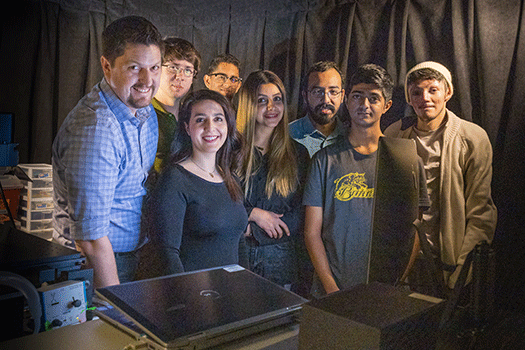
Professor Joel Spencer was a rising star in college soccer and now he is an emerging scientist in the world of biomedical engineering, capturing — for the first time — an image of a hematopoietic stem cell (HSC) within the bone marrow of a living organism.
“Everyone knew black holes existed, but it took until last year to directly capture an image of one due to the complexity of their environment,” Spencer said. “It’s analogous with stem cells in the bone marrow. Until now, our understanding of HSCs has been limited by the inability to directly visualize them in their native environment.
“This work brings an advancement that will open doors to understanding how these cells work, which may lead to better therapeutics for hematologic disorders including cancer.”
Understanding how HSCs interact within their local environments might help researchers understand how cancers use this same environment in the bone marrow to evade treatment.
Spencer studied biological sciences at UC Irvine where he was the captain of the men’s Division 1 soccer team. He initially planned to pursue a career in professional soccer until faculty mentors opened doors for research and introduced Spencer to biophotonics — the science that deals with the interactions of light with biological matter.
“UC faculty were a big part of my research experience; they became mentors and friends,” Spencer said. “My first foray into research was as a lab tech, and that is where I met people who were doing biomedical imaging, and it just caught my wonder.”

Spencer left his native California to earn his Ph.D. in bioengineering at Tufts University in Boston and took a postdoctoral research position in the Wellman Center for Photomedicine at Massachusetts General Hospital and Harvard Medical School. In Boston, he learned about live-animal imaging and his wonder became a passion.
Now his emphasis is on biomedical optics: building new microscopes and new imaging techniques to visualize and study biological molecules, cells and tissue in their natural niches — in living, fully intact small animals.
“I work at the interface of engineering and biology. My lab is seeking to answer biological questions that were impossible until the advancements in technology we have seen in the past couple decades,” he said. “You need to be able to peer inside an organ inside a live animal and see what’s happening as it happens.”
Based on work conducted at UC Merced and in Boston, he and his collaborators — including his grad student Negar Tehrani — visualized stem cells inside the bone marrow of live, intact mice.
He and his collaborators have a new paper published in the journal Nature detailing the work they conducted to study HSCs in their native environment in the bone marrow.
“We can see how the cells behave in their native niches and how they respond to injuries or stresses — which seems to be connected to the constant process of bone remodeling,” Tehrani said. “Researchers have been trying to answer questions that have gone unanswered for lack of technology, and they have turned to engineering to solve those puzzles.”
It’s important for researchers to understand the mechanics of stem cells because of the cells’ potential to regenerate and repair damaged tissue.

Spencer returned to California three years ago, joining the Department of Bioengineering in the School of Engineering at UC Merced. He’s also an affiliate of the Health Sciences Research Institute and the NSF CREST Center for Cellular and Biomolecular Machines . This is his third paper in Nature, but the first stemming from work conducted in his current lab.
He didn’t come to UC Merced just because he loves biology — Spencer also joined the campus because of the students.
“Now I’m back in the UC system – I’m a homegrown UC student who’s now faculty,” Spencer said. “As a student within the system I was able to participate in myriad opportunities, including mentorships that advanced my career. Now I try to encourage graduate and undergrad students to follow their dreams. I love being able to give them opportunities — it’s something I really want to do for the next generation.”



